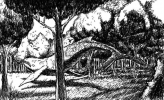Shipyard Locked
How long do I have?
- Joined
- Apr 25, 2017
- Messages
- 2,673
- Reaction score
- 5,722
Does anyone know who originally told this story and perhaps on which forum? I'm paraphrasing of course.
GM: You enter the cavern and see a big beautiful fountain lit by magical globes floating above... but in the fountain there is a leak!!!
[The players are confused by his intensity on that last point.]
PLAYER A: ... Ok. Sure. I guess I will approach the fountain to see if there is anything in the water.
GM: What? Are you sure you want to do that, there's a leak right there.
PLAYER A: Yeah, and? Wait, how big is this leak?
GM: Huh? Medium sized, but that doesn't matter, it's a leak!
PLAYER B: ... Oookay, I guess I'll... try to plug the leak with my hands?
GM: What is wrong with you guys!? Fine, the leak gets mad and uses water magic to attack you, roll for initiative.
[Baffled silent pause.]
PLAYER A: How is a leak casting spells? Is this some kind of elemental?
GM: No, it's undead, don't you know anything!?
PLAYER B: Hold on... spell the name of this creature for me.
GM: A leak! L-I-C-H! Leak!
GM: You enter the cavern and see a big beautiful fountain lit by magical globes floating above... but in the fountain there is a leak!!!
[The players are confused by his intensity on that last point.]
PLAYER A: ... Ok. Sure. I guess I will approach the fountain to see if there is anything in the water.
GM: What? Are you sure you want to do that, there's a leak right there.
PLAYER A: Yeah, and? Wait, how big is this leak?
GM: Huh? Medium sized, but that doesn't matter, it's a leak!
PLAYER B: ... Oookay, I guess I'll... try to plug the leak with my hands?
GM: What is wrong with you guys!? Fine, the leak gets mad and uses water magic to attack you, roll for initiative.
[Baffled silent pause.]
PLAYER A: How is a leak casting spells? Is this some kind of elemental?
GM: No, it's undead, don't you know anything!?
PLAYER B: Hold on... spell the name of this creature for me.
GM: A leak! L-I-C-H! Leak!






 !
! .
.
